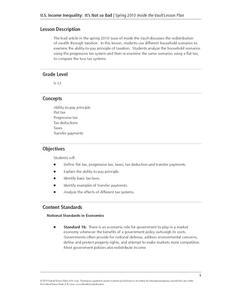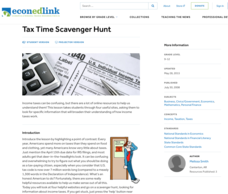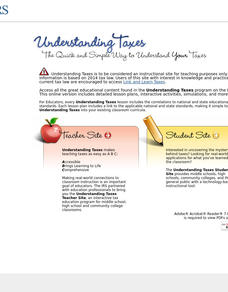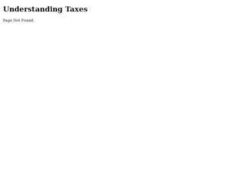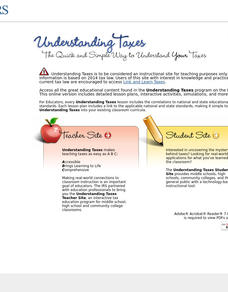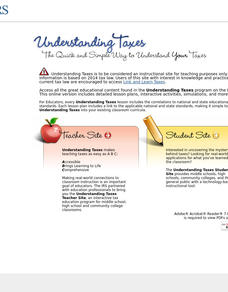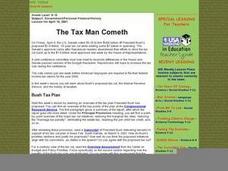Federal Reserve Bank
U.S. Income Inequality: It's Not So Bad
What is the difference between a flat tax, progressive tax, tax deduction and transfer payments? Pupils examine the ability-to-pay principle of taxation through discussion, problem solving, and a variety of worksheets on topics from US...
Curated OER
Taxes in U.S. History: Tax Reform in the 1960s and 1980s
Students explain the content, purpose, and impact of the Tax Reform Acts of 1969 and 1986.
Council for Economic Education
Tax Time Scavenger Hunt
Is a 1040EZ tax form really easy? Scholars investigate the complexities of the United States taxation system with an economics lesson. Using a wide variety of web sources, they interpret IRS taxation rules and regulations to better...
Curated OER
Debate Topics and Ideas
Learners examine both sides of arguments surrounding given debates. They use the internet and other research to collect information to support their stand on the controversial issue. Students debate their chosen topic. This lesson plans...
Visa
Financial Forces: Understanding Taxes and Inflation
Take the opportunity to offer your young adults some important financial wisdom on the way taxes and inflation will affect their lives in the future. Through discussion and review of different real-world scenarios provided...
Curated OER
Circular Flows
To study circular flow, learners use the plans to trace through a series of interconnected economic and financial flows to explain the workings of the American economy. They use the model developed to comprehend the effects of Federal...
Curated OER
Taxes in U.S. History: The Social Security Act of 1935
Students explain the history of the Social Security Act and the FICA tax. They describe what Social Security is and whom it is intended to help. They explain the purpose of the FICA tax.
Curated OER
Taxes in U.S. History: Evolution of Taxation in the Constitution
Students receive an overview of the role and purpose of taxes in American history. They identify different types of taxes implemented by the US government and explain the origin of the federal income tax.
Curated OER
Understanding Tax: Your Role as a Tax Payer
Every adult should know that it is their responsibility to help fund public goods and services by paying taxes. Help young people get a handle on the history, evolution, purposes for, and reasons why they should pay taxes too.
iCivics
Taxation
A paycheck stub can offer loads of information on the taxes American citizens pay. This resource not only includes analysis of a stub as an activity, but also provides a wealth of informative reading material on such topics as the...
Curated OER
Fairness in Taxes: Progressive Taxes
Learners define and give an example of a progressive tax. They explain how a progressive tax takes a larger share of income from high-income groups than from low-income groups. They examine taxation in other countries.
Curated OER
What is Taxed and Why
Students are exposed to the need for federal, state and local governments to tax constituents to provide goods and services for their residents. They identify the different kinds of taxes and give examples of the goods and services taxed.
Curated OER
Taxes: Where Does Your Money Go?
High schoolers explore the concept of taxes. In this tax lesson, students investigate types of taxes and deductions taken out of a paycheck before they see it. High schoolers calculate the tax on a given dollar amount. Students...
Curated OER
Are Taxes "Normal?"
Students explore the concept of normal distribution. In this normal distribution lesson plan, students find the normal distribution of taxes in the 50 US states. Students make histograms, frequency tables, and find the mean and median of...
Curated OER
The Wealth Tax of 1935 and the Victory Tax of 1942
Students explain that during the Great Depression and World War II, the Roosevelt administration implemented new, broader, and more progressive taxes in order to cover the costs of the New Deal programs and the war.
Curated OER
Module 12-Self-Employment Income and the Self-Employment Tax
Students explain self-employment income and the self-employment tax. They distinguish between an employee and an independent contractor and explain how to compute and report self-employment profit.
Curated OER
Fairness in Taxes
Students identify and describe two criterion of tax fairness: benefits received and the ability to pay and distinguish between wealth and income as measures of ability to pay.
Curated OER
Your First Job
Students determine that they are responsible for paying income taxes through withholdings on earned income. They examine the Form W-4.
Curated OER
The Politics Of Taxation
Students explain that taxation involves a compromise of conflicting goals and that lobbyists can influence lawmakers' decisions about taxes. They can explain why people of similar incomes often pay different tax rates and work in teams...
Curated OER
Lesson 2: How Taxes Evolve
Twelfth graders examine the legislative process of enacting federal income tax laws. They conduct research and report on the Federal Migratory Waterfowl Stamp (Duck Stamp) Act of 1934.
Curated OER
The Tax Man Cometh
Students examine websites and resources related to Bush's 2001 tax plan. They discuss the history of taxes and other tax topics. They look for evidence in the local newspaper of government spending at work.
Curated OER
U.S. Constitutional Facts and Figures
In this Constitution worksheet, students fill in the blanks to sentences with facts about numbers in the Constitution. Students fill in 12 blanks.
Curated OER
Mueller v. Allen
Students investigate a First Amendment legal case involving religion, education, and reimbursement of tuition payments. They research the background of the cases and its precedents.
Curated OER
Dependents
Students explain dependency exemption and how it affects taxable income, and apply the five dependency tests to determine whether a person can be claimed as a dependent.


